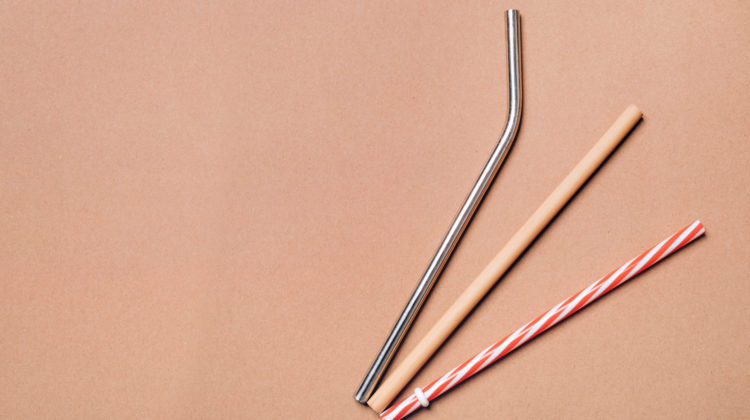
Paper, plastic, metal — or hemp straws? Consumers want alternatives that work. Photo credit: Envato.
Plastic straws suck. Americans discard an estimated 500 million straws each day, leaving twig-like and shriveled shards for clueless creatures to chew.
Paper straws suck, too — and not even that well. Paper straws disintegrate almost immediately in liquid, and it can be a nuisance to sip on what feels like a wet napkin or a sad chopped-down tree.
Luckily, there is a sturdier plant-based alternative on the market: hemp straws.
The Last Straw
At the thought of plastic outweighing marine life and outlasting human existence, consumers might glance sideways at their drink.
And then they might start looking around.
“Plastic is everywhere. It’s in our oceans, creeks, rivers, and it’s in our food and bodies,” Carolyn Virostek, founder of hemp company ExHemplary Life, said. “We’ve gotten to the point where we pick up a bottle of water for $2, and then we toss the bottle and it’s here for eternity.”
In fact, as many as 8.3 billion straws compete for seashell space along the world’s coastlines, according to National Geographic. Even more man-made debris floats in the water.
Hemp plastic, on the other hand, is completely biodegradable. That means microorganisms, bacteria and fungi will degrade the substance seamlessly back into the earth, without leaving toxins behind.
Unlike steel products, which can take decades to erode, ExHemplary Life straws start to biodegrade within 120 days, according to Virostek.
Moreover, because hemp is a renewable and common crop to raise, it will not deplete the earth’s finite resources as fossil fuels do. Early studies indicate that industrial hemp — with its rapid growth and deep roots — can cleanse the soil and water of contaminants through a process called “bioremediation,” according to Rolling Stone.
Breaking Down
Although customers increasingly seek alternatives, hemp straws are not quite readily available on the market. That is in part due to the high cost of manufacturing. So they may also look to companies such as HempZoo, which sells hemp straws in bulk.
“Switching from plastic — which is fossil fuel-based — to hemp is the ideal thing to do, because hemp can break down just like plants,” Virostek said.
Consumers are leading the way in asking for more eco-friendly and sustainable products, which is a good thing, Virostek said.
But when businesses start adding resin, glue or other components to the plant as binding agents; it still becomes a toxic product to the natural landscape.
“They turn to microplastics, and those microplastics then become a part of our environment because they’re so small,” Virostek said.
Essentially, even materials made without fossil fuels can harm our ecosystem and our health. It is for that reason that ExHemplary Life straws do not contain any of those binding agents.
What the Hemp?
Derived from hemp fiber, ExHemplary Life straws are all-natural and break down easily, but not in a margarita.
While the straws are not as long-lived as metal or glass ones, they do stay firm in drinks and can last up to four uses, Virostek said.
“I’ve had it in a drink all day long and it’s not gonna get all mushy and fall apart on you,” Virostek said.
Hemp straws feel like what customers are accustomed to, because they feel and look like real plastic. In other words, unlike metal, bamboo and paper straws, hemp straws do not leave any odd residue or aftertaste in the mouth when sipping on a beverage of choice.
For some, it is a surprise that a plant-based product can perform precisely as advertised.
“Customers question whether it really is not plastic,” Virostek said with a laugh. “There’s no taste, with the feel of a plastic straw as well as the durability you need for a few hours in a drink.”
Reduce, Re-Use, Recycle
Hemp straws take less effort to dispose of properly. After three to four uses, one can toss a hemp straw into the garbage, where it will go to a landfill, but still break down naturally, Virostek said. That is different from metal or glass straws.
“When you’re done with those, even though you might use them for 10 years, you’re gonna have to find a way to break it down or make it into something else so it doesn’t become part of pollution,” Virostek said.
But there are certain ways one can dispose of a hemp straw to minimize potential harm to wild critters, Virostek said. Rather than chucking the used straw in the trash, some cities offer municipal composting programs. Alternatively, consumers can keep an affordable composting bin in the yard, for example.
And those that are especially conscious of the environment may go a step beyond that.
“Cutting (hemp straws) up so they don’t look appetizing to sea animals would be good,” Virostek said, adding that the straws are digestible to animals in the event of consumption.
Spinning (Hemp) Straw Into Gold
A massage therapist by profession, Virostek became interested in hemp-derived CBD and plastic following a health crisis. Six months into her personal use, she started ExHemplary Life.
The website offers a diverse array of industrial hemp products, from tinctures to clothing to straws. The latter have been especially popular.
“I became an advocate for the whole cannabis plant, and hemp specifically, because it was legal,” Virostek said, adding that she believes hemp can make over 25,000 products. “I realized it’s not just about CBD or THC, but it’s really about how the whole plant can be used.”
Expect to see more innovative hemp products in the future, Virostek said. But only if bigger companies understand and are willing to invest in it.
“We need to make changes,” Virostek said. “Whether it’s on a personal basis or manufacturing basis.”



Leave a Reply